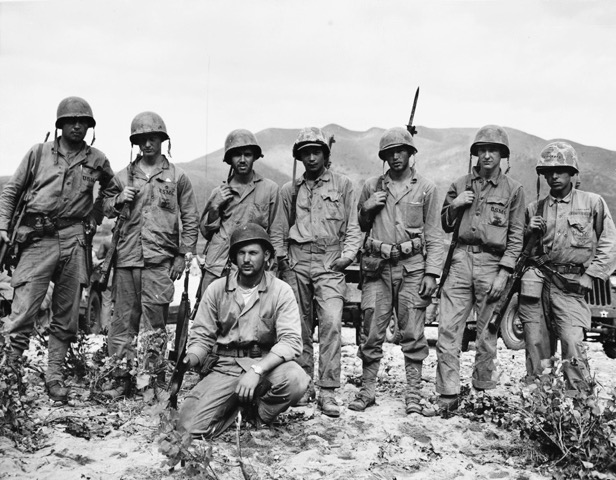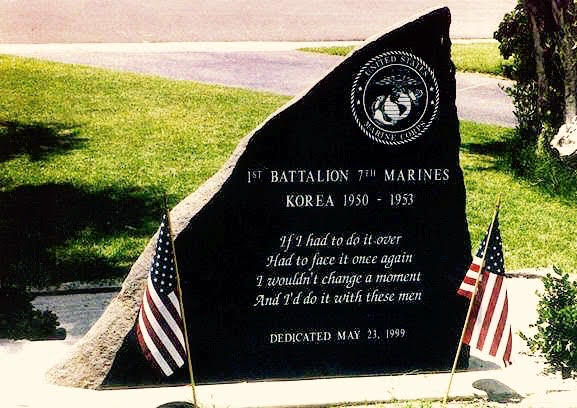One Terrifying Night, Two Heroic Marines
In the early morning hours of May 28, 1952, two Marines, one in Company A and the other in Company C, 1st Battalion, 7th Marines, 1st Marine Division, made one last check of their gear, grabbed their rifles, and prepared to move out.
Their respective platoons were about to launch an attack against Chinese units near the Korean War defensive position known as “Jamestown Line."
Making their way through barbed wire into no-man’s land, the Marines suddenly came under intense small arms, machine gun, grenade, and mortar fire. Pinned against the hillside and outgunned, the Marines began taking casualties.

Marines launch a daylight attack up an enemy-controlled hill in the vicinity of Jamestown Line. (PC: US Marine Corps Archives)
A One-Man Killing Machine
PFC John D. "Jack" Kelly, a 23-year-old Radio Operator with C Company, immediately went into action. Leaving his radio with another Marine and his platoon commander, 2nd Lt. Howard L. Siers, he charged uphill into a “murderous hail of machine gun fire and hand grenades.” His lieutenant, who would later receive the Silver Star for his actions during the engagement, did the same.

Painting of PFC Kelly, USMC (PC: wikipedia)
With all hell breaking loose, Kelly and Siers attacked one enemy emplacement after another. "Firing their carbines, hurling grenades,” and engaging in close-in, fierce combat, the Marines were soon joined by the rest of the platoon.
After destroying a Chinese fighting position and killing two enemy soldiers, Kelly then “singlehandedly assaulted a machine gun bunker,” killing three more men. Lt. Siers, meanwhile, severely wounded and dazed after taking out two Chinese in hand-to-hand combat, began reorganizing the platoon.
Kelly, however, wasn’t finished. Continuing his one-man assault, the PFC, wounded and losing strength, charged toward the last gun position on the hill and "boldly delivered point-blank fire into the aperture of the enemy emplacement.”
The Pennsylvanian, who had enlisted in the Marines only nine months earlier, was hit again by enemy fire, this time mortally. Kelly, described as a "quiet but dedicated" Marine, died moments later. Remarkably, the Marines had secured their objective.
On an adjacent hill, the men of Company A were also fighting valiantly.
Leading His Fire Team
As Cpl. David B. Champagne, a 19-year-old fire team leader, was leading his men towards a Chinese position, small arms and machine gun fire opened up. With his men caught in the open and exposed to withering enemy fire, he did what all NCO’s are trained to do: he took charge.

Cpl. Champagne, USMC, before deploying to Korea, 1951. (PC: wikipedia)
Overrunning trenches and breaching a series of “almost impregnable bunker positions,” Champagne and his Marines crested the hill, destroyed the enemy gun positions, and regrouped.
With his team in a defensive perimeter, the young corporal, who had worked at a local community theater in his hometown of Wakefield, Rhode Island, and dreamed of being an actor, prepared for the inevitable counterattack.
Minutes later, a massive barrage of mortar and artillery fire descended on the hill, followed by waves of Chinese soldiers. Struck in the leg by an enemy bullet and bleeding profusely, Champagne continued to direct his fire team, all the while firing his weapon, throwing grenades, and moving from one fighting position to the next.
Making The Ultimate Sacrifice
At some point during the battle, a "hostile grenade landed amongst his fire team.” Without hesitation and in total disregard for his own safety, he grabbed the explosive and “hurled it in the direction of the approaching enemy.”
As the grenade left his grasp, it detonated, blowing off the young Marine’s hand and throwing him out of his trench. Now lying in the open and mortally wounded, he was hit by enemy mortar fire and died instantly. His remarkable courage and determination to “close with and destroy the enemy” had won the day and saved his men.

Marine bunker gets hit by enemy fire, circa 1951. (PC: US Marine Corps Archives)
Postscript:
The next day, 45 Chinese bodies were found in the vicinity of the battle. The Marines estimated that another 40 enemy soldiers had been killed and more than 40 wounded.
PFC Kelly and CPL Champagne were both posthumously awarded the Medal of Honor. The young Americans, who had voluntarily joined the Marines, sacrificed their lives for their buddies, and helped save South Korea from falling to the communists, were two of the nine Marines killed on May 28, 1952. Over 100 more were wounded.
Jack Kelly, best known at Steel Valley High School (formerly Homestead High School) for playing on the state championship basketball team, was memorialized in his hometown with the Jack Kelly Monument.
David Champagne's nephew and namesake, David Bernard Champagne, became a Marine. “I’m proud to be named after my uncle," he says in a tribute at the Korean War Project. His son Duane Champagne, CPL Champagne’s great nephew, also became a Marine.
Today - the day after Memorial Day - we continue to pay tribute to all those who made the ultimate sacrifice defending our country and its allies. We will never forget you.
Top/Feature picture: Marines in Korea, circa 1951 (PC: US Marine Corps Archives)


